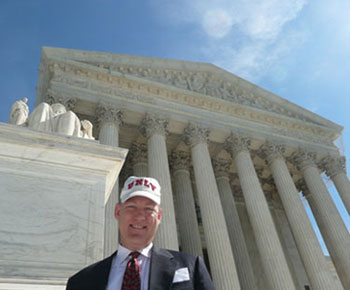Boyd School of Law Alumnus Appears Before U.S. Supreme Court
Boyd alumnus Henry Jacobs appeared before the U.S. Supreme Court in a case involving the Fourth Amendment to the U.S. Constitution.
The case, “Arizona v. Gant,” decided whether under the Supreme Court’s 1981 decision in “New York v. Belton (1981)” police may conduct a warrantless search of a car if its recently arrested occupant poses no threat to officer safety or preservation of evidence.
The case involved Rodney J. Gant, who was arrested by Tucson, Arizona police for driving on a suspended license, handcuffed, and locked in a patrol car before officers searched his car and found cocaine. The Arizona trial court denied his motion to suppress the evidence, and he was convicted of drug offenses.
Jacobs served as Associated Counsel of record and his brother, Thomas Jacobs, served as lead counsel for Gant and argued the case at the Supreme Court hearing.
He argued that an unreasonable expansion of a limited authority provided by “New York v. Belton” to search vehicles incident to arrest was occurring. Lower courts were allowing searches after the initial justifications for setting aside the Fourth Amendment’s warrant requirement had ceased to exist. Jacobs argued, and the Court agreed, that such application of the “Belton” exception caused it to “swallow the rule,” allowing unconstitutional searches.
Prior to the Supreme Court hearing, which was held on October 7, 2008, Henry Jacobs and his brother participated in a moot argument conducted at the Boyd School of Law by Professors Jeffrey Stempel, Lynne Henderson, and former Lawyering Process Professor Kevin Oates, with support from Professor Steve Johnson. The argument was conducted before an assembly of several legal writing classes at the law school.
SCOTUS Wiki: http://www.sc... style="text-decoration: underline;">
Slip opinion: http://www.suprem...
